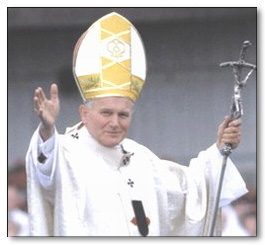What Evangelicals Can Learn From the Pope
- JANICE SHAW CROUSE
The non-stop television coverage of Pope John Paul IIs death, and the retelling of his life as the final spark of his vibrant personality flickered and died, has dramatically brought into focus the profound impact and significance of this man from Poland. From the unprecedented gathering of mourners kings and presidents, rich and poor it is clear that his influence extended far beyond the Roman Catholic Church.
 |
The response to the death of the pope more than 2 million are expected at his funeral proves the truth of the oft-repeated claim that there is a God-shaped vacuum inside each human being. The millions who have watched the television coverage or made pilgrimages to Rome to pay their last respects to him lying in state at St. Peter's Basilica testify to the yearning in peoples hearts for an example of someone passionately committed to loving the Lord God, undividedly, with heart, soul and mind. Even those who disagreed with John Paul respected his spirituality and the conviction that would not bend in the face of disapproval and opposition.
What can evangelicals learn from a man who inspires such an outpouring of respect and affection? What can we learn from a man who, despite his age and old-fashioned commitment to the ancient truths of his faith, stirred the hearts of young people and rallied them in multiple nations around the world?
The pope embodied commitment and consistency
In an era rampant with scandals and hypocrisy, the pope was a leader whose integrity both challenged and inspired. He was a public figure whose life consistently embodied his faith. He was willing to put everything, including his life, on the line. His authority stemmed not just from his position at the head of the Catholic Church, but also from his inner strength and moral stances. During his papacy, the number of Catholics worldwide doubled.
The pope was both moral and intellectual
In an era when pseudo-sophistication reigned, John Paul developed deep intellectual roots that informed his faith and provided a strong rationale for his moral positions. He was not willing to settle for what Ralph Woods described in First Things as saccharine substitutes for the hard-thinking that the Christian faith requires. He combined spiritual depth with intellectual rigor. He published 14 tightly reasoned encyclicals on social, theological and moral issues that became a strong voice for Judeo-Christian values and Biblical truth in an increasingly secularized and coarsening culture.
The pope related across generations
Those who embrace the cliché that everything has to be novel in order to appeal to the next generation could learn from this pope, whose winsome ways drew youth to him and to faith. John Paul related to young people with genuine concern coupled with enthusiasm, a sharp sense of humor and quick wit. In so doing, he presented faith in fresh and vital ways for a whole new generation of believers. His background in drama taught him the power of image-making but he did so without sacrificing his dignity or crossing the line to embrace the latest fads. His piety, however, was not for show.
The pope was willing to go against the tide of popular opinion
For over a quarter of a century, John Paul, an essentially humble priest, stood fast against secularism in uncompromising support of the fundamental tenets of the faith. He protected the vulnerable including the unborn, by consistently opposing abortion and he stood up to the powerful who sought to replace Christian dogma and traditional standards of morality with trendy ideology generated by mere human imagination. Those who are prone to go along with cultural trends in their frantic efforts to be relevant could learn much from this pope who proved that conviction is more appealing than contemporary repackaging of the faith.
The pope made holiness manly
Many of todays generation have never seen holiness manifested in manly demeanor. They think of believers as weak wimps in contrast to the proud, swaggering behavior of worldly non-religious men. This pope, even when frail and limited by Parkinsons disease, was resolutely masculine.
In a world where so many believers are unwilling to bend the knee before the Almighty, the pope was a man who spent at least four hours a day in prayer. When the world around him was demanding that religion be watered down to conform to the postmodern worldview, he challenged believers to a more rigorous faith. In a culture more responsive to a gospel of prosperity, he challenged Catholics to reject materialism and lifted up a vision of sacrifice and service. He issued a high calling and people responded. Out of the depths of rock-solid character, this was a man who, even when stooped and palsied, spoke with authority . . . and the whole world listened.
 This is Meaghen Gonzalez, Editor of CERC. I hope you appreciated this piece. We curate these articles especially for believers like you.
This is Meaghen Gonzalez, Editor of CERC. I hope you appreciated this piece. We curate these articles especially for believers like you.
Please show your appreciation by making a $3 donation. CERC is entirely reader supported.

Acknowledgement
Janice Shaw Crouse. "What Evangelicals Can Learn From the Pope." Concerned Women for America (February, 2004).
This article reprinted
with permission from Concerned Women for America.
Concerned Women
for America is the nation's largest public policy women's organization with a
25-year history of helping our members across the country bring Biblical principles
into all levels of public policy.
The Author
Janice Shaw Crouse is Senior Fellow at Concerned Women for America.
Copyright © 2005 Concerned Women for America



